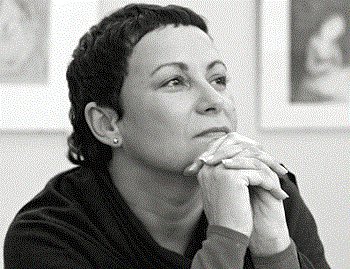When, burying your nose, you examine the various strokes of the picture, you still do not see and do not understand it. So is Lena's prose…
"Their manners" with a Russian accent

When, burying your nose, you examine the various strokes of the picture, you still do not see and do not understand it. Similarly, the prose of Lena Etlang is not perceived until you connect these strokes, moving away to a decent distance. Not a new, already familiar literary device, when the author does not narrate, does not explain. You are let into the inner world of heroes. When you immerse yourself in fragments of memories, conversations in a tavern, diary entries, you begin to live in an atmosphere of a place completely unknown to you, an unfamiliar way of life, strange problems – “their morals”, in short.
It all happened in Britain, in Wales, on the coast of the Irish Sea, on the streets of Wishgard, inside the boarding house "Stone Maples". "Maples" belong to the main character and her half-sister, whom no one has seen for four years. Sasha and Edna Sonli.
“The estate was called “Stone Maples” not because of the maples at all,” Mom explained to Sasha one summer day, “there were no maples here, it’s just that when we arrived here, Deirdre looked at the runes, and your Calc rune is connected with the maple and rowan. I suggested that my father name the estate “Kleny”, but he said that maple is a weak tree, and added the word stone. Here you are, Sasha, stone in appearance, but inside you have a weak tree, although my father and I put hawthorn leaves in your cradle, and you should have grown up a bully and a daredevil.
Sasha loved her mother. She understood and admired her.
“I envied my mother’s skillful indifference: the neighbors admired her flower beds and despised her for sickness and whims, but she didn’t even remember their names, she was like a blade, hardened to absolute cold, impenetrable and shiny. Impatience and painful boredom seethed in her like acid in a retort, but only she and I knew about it, and my father did not know. But he knew something else about my mother, which I didn’t know at the time.”
After the death of his mother, everything changed: "… the gates of the Stone Maples were locked, and there were no stones or maples around – only burnt blackberry lashes on a wall made of uneven pieces of sandstone, severe Roman masonry: no fire is terrible for such a house … “Sonli inn” was stamped on a copper plate, under it hung another one – a larger one, made of tinplate: “Caution, there are angry dogs in the yard”, on the bottom plate someone smallly attributed with a red felt-tip pen: “and insidious snakes”.
The father remarried.
“When my father married Hedda, late poppies were just about to bloom behind the house.
Hedda threw up her hands when I showed her my mother's alpine slide – oh, I thought it only happens in May!
The youngest sat on the porch all day, frowning her bulging childish forehead, her mother obviously had no time for her, she went around the house with a bunch of her father's keys – I, of course, did not allow me to take my own.
“You will have to make friends with both of them,” said the father, looking at the bald hill, “you have nowhere to go from here, right?
“They never had a home of their own,” he said after some more time.
– And what, now they will have my house, but I will not have any? I asked, throwing my head back to look into his face. “Father was tall and it wasn’t easy to catch his eye.
I was sure that he would laugh, lean over and kiss the top of my head, he always did in anticipation of my tears, but he just shook his head.
Father died. The stepmother went to India. Step sister is missing. Closed, strange, with Russian roots, Sasha was treated like a witch. It was even suspected that she had killed her sister. “Sasha Sonli is presented to us as an unusual and exceptional personality. For all her erudition, the only thing she does in life (except for the not very successful hotel business) is cherish her anger at her stepmother and half-sister and nostalgic for her childhood. She is far from stupid and subtly feels the world, but her exorbitant pride and anger causes rejection.
Here the question is: an exceptional person must be active and successful? She was left alone with the collapsing boarding house and hostile neighbors and survived.
Lena Eltang herself says: “This is a book about a thirty-year-old woman in whom silence has come. And she can't talk anymore. Not because she was numb, but because she had absolutely nothing to say, she ran out of words … About how this woman gets out of the state of a person defeated by chaos, very quietly, very intimate, not at all bright, not noisy, not scandalous.
Lena Eltang is Russian, born in Leningrad in 1964, graduated from the journalism faculty of Leningrad State University, lived and worked in Paris, Copenhagen, London, then moved to Vilnius, where she lives to this day. She made her debut in major prose in 2006 with the novel Kumanika Escape. Immediately after the release of this work, they unanimously and openly began to call it a masterpiece, and the author began to predict a prominent place on the global shelf of the age-old classics of Russian literature.
“The novel is emphatically, rigorously European – not British, not English, not Welsh, but unified European – and paradoxically Russian. It has that elusive taste of emigrant, non-Russian prose, which is found in the late Bunin and Nabokov, and, perhaps, in no one else. This novel is made Russian by Sasha and Lisa Sonley, who tightly pin their chestnut braids with hairpins, write in quarters in Cyrillic incomprehensible to anyone on the island, creating some special, incomprehensibly familiar atmosphere of a Russian estate in a modern Welsh house.
The language is slow, redundant for us, with numerous references to the classical works of the Greeks and Romans and the Bible (you're already bored).But I know for sure: it does not hurt much, because several lines of this novel give more opportunities to "collapse someone else's life" than hundred sheets of description. The heroine is the daughter of Russian and Welsh. And if the Welsh is called the Englishman, then for this in some pub you can earn in the eye. Because it is not England, but Wales. Language metaphoricity is a Welsh tradition.
So about the book: It feels like "if it is a good shake, then from pages – I'm sure! – Screw the scratched rose berries, similar to beads of broken rosary, juniper needles, parchment and dry autumn leaves, tasty crispy marine pebbles, flashing fragile rods and somewhat neatly folded letters written by nimble flying handwriting. We only need to shake well … "
In principle, all this Sasha will be fine. The weak maple tree inside it will become stone. And two will find each other in Welsh Fog. And with my sister, everything will determine: her grave in the garden will be simply symbolic, and she herself will be shallow and unnecessary. Think before reading what you need from the book.

